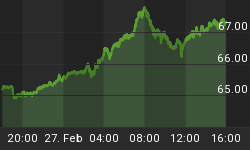Increasingly, Fund Flows have been used to offset any rise in yields. More command performance from Chairman Alan Greenspan. The latest decline in yields can be attributed to inflows bidding price up and yield down. Following the greatest liquefaction scheme in history, this most recent 25 basis point rise in Fed Funds has resulted in an about face in market psychology. The Markets clearly now believe we have now seen the end of low rates for this business cycle.
Any panic in equities will certainly seek safe havens; the Central Bankers are counting on this as they need to maintain the United States Uber Bubble in Housing and the adjacent Derivatives Bets in Rates. These two colossus are the very pinnacle of this economic cycle. The Financial economy, a hostage of its own machinations, is bucking wildly.
Control is clearly being exercised as the Flood Gates continue to creak.
Conventional wisdom appears to be suggesting Rates, Real Rates may continue to fall in the short run. This is certainly possible and with good cause, but will all those Variable Rate Products be allowed to shift to a Fixed environment? Unfortunately, most of this wisdom was imparted to us via the Federal Reserve's own think tank.
I would suggest their convention is going to be tested and market forces are going to begin exerting themselves in rapid succession. The end of "Money for Nothing" is upon our "Planners" and their efforts are beginning to look tepid at best.
Forcibly lower Rates appear to remain in the playbook for now, but the bullet has not left the gun's barrel, when it does we can rest assured Alan and Company will step aside.
Were the Federal Reserve to reverse course, as some have suggested, they will have blinked badly. Rising Fed Funds have been co-joined to an improving economic environment. This fallacy continues in play for now, but what happens when the inevitable "accident" comes calling.
It provides the excuse for a reversal, but will it in fact be "accepted" by the markets?
The Bond Market understands Chairman Greenspan is playing roulette, but has very little latitude in which to operate as the alternatives are in question. Equities have been the hot casino while Balance Sheets begin to suffer across the Fixed Income spectrum. Losses are being masked by rampant speculation at Alan's punch bowl with absurd returns elsewhere to keep the game aloft a little longer.
Do we witness a loss of control and outright deflation or will Sir Alan attempt to plug every hole with confetti, yet once again thereby sending the dollar into it's demise and altering reality once again?
Market forces are going to have the final word and I fully suspect they will temper any change in bias very quickly. A Financial System based upon Debt will require increasingly greater returns in order to maintain itself, or it simply will be left wanting.
Capital has behaved in a most unconventional way over the last three years as within the interlocked Global Financial System, our demise is going to assure a number of others join the ride in lock step.
At some point in the not too distant future, one of our Financiers is going to begin to beg the invariable "Quid Pro Quo Alan?" The equivalents will be few and far between.
Truly an "All or Nothing" gambit: As Russell suggests, "He who loses the least, wins."
The Fed cannot afford a Credit tightening, it faces a deflating Mortgage Bubble and an unprecedented growth in Derivatives, yet unlimited credit elasticity has a way of snapping back rather suddenly when credit becomes scarce.
I happen to believe this is precisely what will happen.
Why?
Our Creditors are saying this is so.















